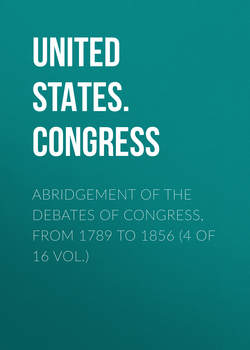Читать книгу Abridgement of the Debates of Congress, from 1789 to 1856 (4 of 16 vol.) - United States. Congress - Страница 58
TENTH CONGRESS. – SECOND SESSION.
PROCEEDINGS AND DEBATES
IN
THE HOUSE OF REPRESENTATIVES
Monday, December 19
ОглавлениеMiranda's Expedition
Mr. Love called for the order of the day on the report of the committee on the subject of the thirty-six persons confined in Carthagena, South America. The following is the resolution reported by the committee:
Resolved, That the President of the United States be requested to adopt the most immediate and efficacious means in his power to obtain from the Viceroy of Grenada, in South America, or other proper authority, the liberation of thirty-six American citizens, condemned on a charge of piracy, and now held in slavery in the vaults of St. Clara, in Carthagena, and that the sum of – dollars be appropriated to that purpose.
Mr. D. R. Williams moved to postpone the consideration of the subject indefinitely. Negatived – 50 to 36.
The House then went into a Committee of the Whole on the subject – 39 to 33.
Mr. Love moved to amend the resolution by striking out the words in italics, and inserting "authorized to request." – Carried, ayes 54.
Those gentlemen who supported this resolution in the debate were Messrs. Love, Lyon, Bacon, Nelson, Sloan, and Wilbour. Those who opposed it were Messrs. D. R. Williams, Taylor, Smilie, Macon, and Southard.
The gentlemen who opposed the resolution, among other objections, contended that an agreement to the resolution would but involve the Government in difficulty without answering any good purpose; that it would in fact be aiding the attempt of a certain party to prove that the General Government had some connection with this expedition originally, which it certainly had not; that the facts set forth in the petition were wholly unsupported by evidence; that these persons had engaged themselves in a foreign service; that they had become weary of the privileges of freemen, and had entered into a hostile expedition against a foreign country, and, in so doing, had been taken, condemned for piracy, and immured as a punishment for that offence; that the British Government, having been at the bottom of this business, was the proper power to release these persons, and indeed had applied to the Spanish commander for the purpose; that even were the United States bound by the laws of justice or humanity to intercede for these persons, they knew not to whom to make application, and would probably meet with a refusal, perhaps a rude one, if any judgment could be formed from the present situation of our affairs with Spain; that if gentlemen wished for objects on which to exercise their humanity, they might find them in the lacerated backs of our impressed seamen, without extending it to criminals. In reply to an observation of Mr. Lyon, that if we did not get these men Great Britain would do so, and employ them to extend her naval force, Mr. Macon replied, if she did, she was welcome to keep them; but she was in the habit of supplying her navy with seamen from our vessels, without the trouble which the acquisition of these men might occasion her.
In reply to these objections, and in support of the resolution, the humanity of the House was strongly appealed to. It was urged that the Government could in nowise be involved by an appeal to the generosity of the provincial government; that these men had not wilfully committed piracy, but had been deluded under various pretences to join the expedition; that they had joined it under a belief that they were entering into the service of the United States; that, even admitting them to have been indiscreetly led to join the enterprise, knowing it to be destined for a foreign service, yet, that they had been sufficiently punished by the penalty they had already undergone; that it was wholly immaterial what inference any persons might draw from the conduct of the United States in this respect, as to their concern with the original expedition; that such considerations should have no weight with the House; that if these poor fellows were guilty, they had repented of it; and Mr. Nelson quoted on this point the Scriptures, to show that there should be more joy over one sinner that repenteth, than over ninety and nine who have no need of repentance. In reply to an intimation that it was not even ascertained that they were American citizens, Mr. Bacon observed that one of them had been born in the same town in which he was, and was of a reputable family.
The resolution was negatived by the committee – 49 to 31.
The committee rose and reported the resolution, which report the House agreed now to consider – ayes 57.
The question of concurrence with the committee in their disagreement to the resolution, was decided by yeas and nays, 50 to 34.
On motion, the House adjourned.
